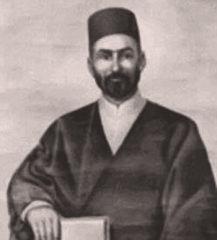Ali Mojuz
This article includes a list ofgeneral references,butit lacks sufficient correspondinginline citations.(February 2014) |
Ali Mojuz | |
|---|---|
 | |
| Born | 1873 Shabestar,Iran |
| Died | 1934 Shahrud, Iran |
| Occupation | Poet |
Ali MojuzorMirza Ali Mojuz Shabestarti(Persian:معجز شبستری-,Azerbaijani:Mirzə Əli Möcüz-میرزا علی معجز) was anIranian Azerbaijanipoet.He chose to write inAzeri Turkishinstead ofPersian,Iran's dominant language.[1]
He was born on March 29, 1873, inShabestar,to amerchantfamily. Mojuz left his birthplace at age 16 after his father's death. He joined his brothers in Istanbul who ran astationerybusiness.[1]He later studied at a school oftheology.In 1889, he moved toTurkey,where he published his firstpoems.Mojuz returned to hishomelandin 1905.
Under the influence ofAzeridemocraticliterature, especiallyMirza Alakbar Sabir,he wrotesatiricalpoetry. His main themes were the "disempowerment of the people" ( "Motherland", "Every Day", etc.), his "struggle against the oppressors" and the "position of enslaved women" ( "Unhappy Girl", etc.) Mojuz also praisedVladimir Lenin( "Lenin" ), and was interested in theOctober Revolution of 1917( "Revolution breaks out", "Finally", etc.).
After the collapse of the government of Azerbaijan, Mohammad Reza Shah's reign over Iran (1941–79) included a very strict ban on the publication of Azeri works.[2]Mojuz turned to writing for recitation to illiterate, rural Azeris.[3]
His poetry was first published in 1945. A selection of his works entitledMirzə Əli Möcüz: Seçilmiş Əsərləri(Mirza Ali Mo’juz Selected Works) in Tabriz. Two thousand copies sold out in “ten to fifteen days."[4]
Works
[edit]- Poetry, Baku, 1955
- In Russian. per. - Poems. [Pre. G. Mammadali], B., 1956, Proc.: An Anthology of Azerbaijani poetry, v. 2, Moscow, 1960, p. 244-58
Sources
[edit]- Akhundzadeh.Alifba-ye Jadid va Maktubat.pp. 249–251.
References
[edit]- ^abHadi, Sultan Qurraie (1997).Modernity and Identity in Azeri Poetry: Mo'juz of Shabustar and the Iranian Constitutional Era.UMI.
- ^Nasiru’ddin Tusi (1957).Akhlaq-i Nasiri.Kharazmi Publishing.
- ^Akhundzadeh,pp. 249–251.
- ^Akhundzadeh,p. 38.
Links
[edit]- Ali MojuzinGreat Soviet Encyclopedia
- Omarova LA, Ali Mojuz Shabestarti, "Math. Azerb. SSR", 1955, № 5
- Omarova L., Ali Mojuz Shabestarti, Baku, 1958.
